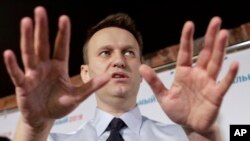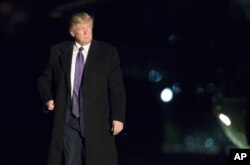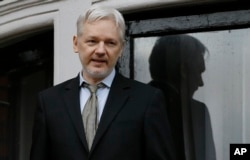Russian opposition leader and anti-corruption blogger Alexei Navalny did not fall into despair after a court in Kirov on February 8 upheld his guilty verdict in the Kirovles embezzlement case.
The court's ruling, which almost to the letter reiterated the verdict reached in a 2013 trial, has created a formal barrier to Navalny registering as a candidate in Russia's presidential election, to be held in March 2018, given that Russian law bars those convicted of grave crimes from running for office.
Navalny was found guilty of embezzlement and received a five-year suspended jail sentence in the Kirovles case, which he and his supporters says was a politically motivated prosecution. Despite the verdict, he believes his constitutional right to participate in elections remains in effect, and is confident that public support will help make it possible for him to run in next year's presidential vote.
The opposition leader is trying to organize a wide support network, and he says he is already starting to open campaign offices for the March 2018 election.
In an interview with VOA's Russian service, Navalny discussed various issues, including where he will open campaign offices in the near future, whether he feels personally safe, and how he feels about being compared to U.S. President Donald Trump.
What plans do you have to open campaign offices?
We have already opened a campaign office in St. Petersburg. Next week, we will open campaign offices in Yekaterinburg, Novosibirsk meaning, first of all, in cities. Our goal is to open campaign offices in Russia's 77 largest cities.
Has there been any kind of reaction to these plans from the Russian regional authorities in the cities you are talking about?
Well, so far we haven't seen any big reaction. Understandably, one cannot speak of any support, but thus far we have not seen any significant resistance. I think it's simply that no serious signal has yet reached the regions. In St. Petersburg, we saw that (the ruling) United Russia (party) demanded that our campaign office be closed. … I think the opening of the first five campaign offices will tell us more about what the Kremlin has planned for us.
Politicians say that you are being "proactive," relying on a social movement which, one way or another, will put pressure on the Russian government to recognize you as a legitimate contender. Is that the case?
I would say more broadly that there are simply people who need a new candidate. I appeal to the people, and the people, in fact, understand that this is all legal tricks. They see that there is a person, and that he has the right to participate in elections. … Therefore, I appeal to the people in order to exert the necessary pressure on the Kremlin to force it to register me. There is no other way to do it.
What form do you see this pressure taking?
Any setting up campaign offices, propaganda work, shaping public opinion on the streets and on the internet — all available methods.
And will a class-action suit be filed? Because you say it is about the conflict between the constitutional right to participate in elections and restrictions in the law.
We do not exclude that. It is more time-consuming work. And, given the situation with our courts, it is clear what the result will be. However, we will move in different directions simply because people want to do different things. There are some who like to sue. We will be suing together with them, too.
Do you feel that anything changed in terms of your and your families' personal security since the first verdict in the Kirovles case in 2013?
Well, if you compare Russia in 2013 and in 2017, it is simply a different country. It is absolutely a different country! Since that time, Boris Nemtsov was murdered. Attacks on people happen practically daily. Chechnya has become a fascist state, where people are tortured and killed. It is therefore impossible to compare the dynamics; it is two different countries. Of course, it's much worse now. But that does not, in general, change our approach to what needs to be fought for.
Have the threats to you personally increased?
Various objects are thrown at me more often; people lie in wait for me near the office, but not so often that it is highly noticeable. No, there aren't such (threats) specifically against me. But we see them against people connected to me.
During Donald Trump's presidential election campaign, Russian media compared you to him, finding some similarities. How do you feel about this comparison?
I don't know where that came from. Journalists constantly need to compare me to someone. Fortunately, they stopped comparing me with Julian Assange, but began comparing me with Trump. If you just look at our political agendas and political views, there are quite a few differences. But in today's political society, probably, this is somehow ignored. For example, Trump and Putin very much love each other, although their political views are simply 100 percent diametrically opposed.
In Europe, there is now fear of the impact of Russian propaganda on elections. This propaganda is associated with the growth of populist sentiment, with candidates tossing out slogans like "Tomorrow, I will give you everything!" to the crowds, and people beginning to follow them. Do you see the danger of populism? Do you think that there is a clear line that separates you from populism?
I don't see the danger of populism. I think it's exaggerated. What is populism? Someone says things that are popular. In fact, these things are not always particularly extremist. I'm an adherent of the view that politics develop like a swinging pendulum. We have seen a long liberal trend; it has been the last two decades in world politics. Now, obviously, there is a correction of this trend, or even a trend in the opposite direction. I don't think that will last long. Overall, it seems to me that over long stretches of time we will, as before, continue to see a liberal trend in European politics.


